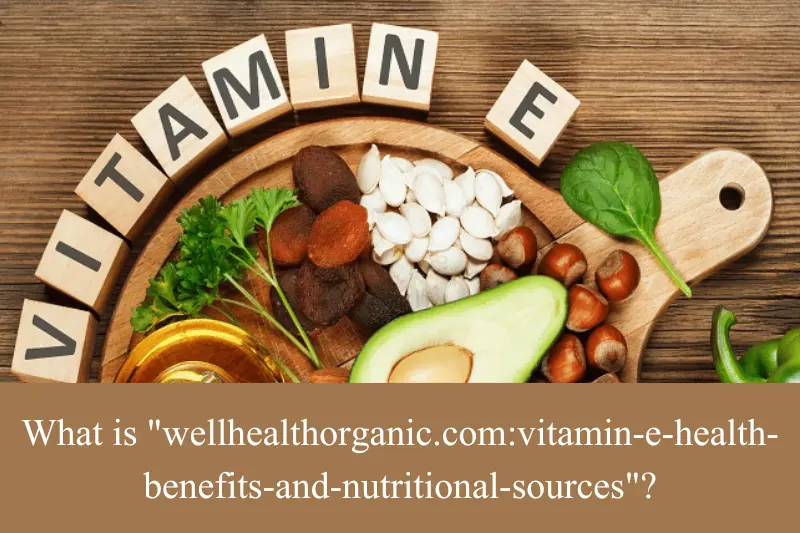Vitamin E is a potent antioxidant that plays a crucial role in maintaining overall health and well-being. From supporting immune function to promoting skin health, vitamin E offers a multitude of benefits for the body. At Wellhealthorganic.Com, we delve into the numerous health benefits of vitamin E and explore its nutritional sources to help you incorporate this essential nutrient into your diet for optimal health.
Understanding Vitamin E
What is Vitamin E?
Vitamin E is a group of fat-soluble compounds known for their antioxidant properties. The main forms of vitamin E include tocopherols and tocotrienols, with alpha-tocopherol being the most biologically active form in the human body.
Functions of Vitamin E:
- Antioxidant Protection: Vitamin E acts as a powerful antioxidant, neutralizing free radicals and protecting cells from oxidative damage caused by environmental stressors and toxins.
- Immune Support: Vitamin E plays a vital role in supporting immune function, helping to strengthen the body’s defenses against infections and diseases.
- Skin Health: Vitamin E is beneficial for skin health, promoting hydration, elasticity, and protection against UV damage. It is commonly used in skincare products for its moisturizing and anti-aging properties.
- Heart Health: Vitamin E may help support cardiovascular health by preventing the oxidation of LDL cholesterol, reducing inflammation, and improving blood vessel function.
- Brain Function: Vitamin E has been studied for its potential role in cognitive health and brain function. It may help protect against age-related cognitive decline and neurodegenerative diseases such as Alzheimer’s disease.
- Eye Health: Vitamin E is essential for maintaining eye health, particularly the health of the retina and lens. It may help reduce the risk of age-related macular degeneration and cataracts.
Health Benefits of Vitamin E
1. Antioxidant Protection
As a potent antioxidant, vitamin E helps combat oxidative stress and reduce the risk of chronic diseases such as cancer, heart disease, and diabetes. By neutralizing free radicals, vitamin E protects cells from damage and supports overall health and longevity.
2. Immune Support
Vitamin E plays a critical role in supporting immune function and enhancing the body’s natural defense mechanisms. It helps regulate immune responses, promote the production of immune cells, and protect against infections and illnesses.
3. Skin Health and Beauty
Vitamin E is renowned for its benefits for skin health and beauty. It helps nourish and moisturize the skin, promote collagen production, and protect against damage from UV radiation and environmental pollutants. Vitamin E is often used in skincare products to improve skin tone, texture, and elasticity.
4. Heart Health
Studies suggest that vitamin E may have protective effects on heart health by reducing oxidative stress, inflammation, and cholesterol oxidation. Regular consumption of vitamin E-rich foods or supplements may help lower the risk of heart disease and improve cardiovascular outcomes.
5. Brain Function and Cognitive Health
Vitamin E has been studied for its potential role in preserving cognitive function and reducing the risk of age-related cognitive decline. It may help protect brain cells from damage, improve neurotransmitter function, and support overall cognitive health and memory.
6. Eye Health
Vitamin E is essential for maintaining optimal eye health and vision. It helps protect the eyes from oxidative damage, reduce the risk of age-related eye diseases such as macular degeneration and cataracts, and promote overall eye function and clarity.
Nutritional Sources of Vitamin E
1. Nuts and Seeds
Nuts and seeds are excellent sources of vitamin E, including almonds, sunflower seeds, hazelnuts, and peanuts. Incorporating a handful of nuts or seeds into your daily diet can help boost your vitamin E intake and support overall health.
2. Vegetable Oils
Vegetable oils such as wheat germ oil, sunflower oil, safflower oil, and olive oil are rich sources of vitamin E. Use these oils for cooking, salad dressings, or drizzling over dishes to increase your vitamin E consumption.
3. Green Leafy Vegetables
Green leafy vegetables such as spinach, kale, Swiss chard, and broccoli contain vitamin E and other essential nutrients. Include a variety of leafy greens in your meals to enhance your vitamin E intake and promote overall health.
What is “wellhealthorganic.com:vitamin-e-health-benefits-and-nutritional-sources”?

“wellhealthorganic.com:vitamin-e-health-benefits-and-nutritional-sources” refers to a comprehensive guide that explores the various health benefits and nutritional sources of Vitamin E.
Essentially, it’s a resource that provides valuable information about how Vitamin E can positively impact your health and where you can find it in your diet.
Whether you’re curious about the benefits of Vitamin E or interested in incorporating it into your daily nutrition, this guide is here to help you understand all there is to know about this essential nutrient.
Why is “wellhealthorganic.com:vitamin-e-health-benefits-and-nutritional-sources” Important?
Essential Antioxidant Protection:
- Vitamin E is a potent antioxidant that helps protect your cells from damage caused by free radicals, thereby reducing the risk of chronic diseases like cancer and heart disease.
Skin Health and Beauty:
- Vitamin E plays a crucial role in maintaining healthy skin by promoting cell regeneration, moisturization, and protection against UV damage, resulting in youthful and radiant skin.
Immune System Support:
- By bolstering the immune system, Vitamin E helps your body defend against infections and illnesses, keeping you healthy and resilient year-round.
Heart Health Maintenance:
- Vitamin E contributes to heart health by preventing the oxidation of LDL cholesterol, reducing the risk of plaque buildup in arteries and lowering the chances of cardiovascular diseases.
Eye Health Enhancement:
- Studies suggest that Vitamin E may help prevent age-related macular degeneration and cataracts, promoting better vision and eye health as you age.
Brain Function Improvement:
- Vitamin E has been linked to improved cognitive function and reduced risk of cognitive decline in older adults, potentially delaying the onset of conditions like Alzheimer’s disease.
Reproductive Health Support:
- For both men and women, Vitamin E plays a role in fertility and reproductive health by protecting reproductive cells from oxidative damage and supporting hormone balance.
Muscle Recovery and Repair:
- Athletes and active individuals can benefit from Vitamin E’s ability to reduce exercise-induced oxidative stress, aiding in muscle recovery and repair after strenuous workouts.
Hair Growth and Strength:
- Vitamin E promotes healthy hair growth and strength by improving blood circulation to the scalp, nourishing hair follicles, and preventing oxidative stress that can lead to hair loss.
Essential Properties of Vitamin E
- Antioxidant: Neutralizes free radicals, preventing cell damage and oxidative stress.
- Strengthens the immune system: Contributes to the normal function of immune cells and protects against infections.
- Protects cardiovascular health: Reduces the risk of heart disease by decreasing the oxidation of LDL (“bad”) cholesterol.
- Maintains skin health: Promotes skin elasticity and hydration, delaying the appearance of wrinkles and signs of aging.
- Enhances eye health: Prevents age-related macular degeneration and cataracts.
- Cognitive function: Protects brain cells from oxidative damage and may help prevent neurodegenerative diseases like Alzheimer’s.
Subsection: The Different Forms of Vitamin E
There are several forms of vitamin E, with alpha-tocopherol being the most common and biologically active form in the human body. Other forms include beta-tocopherol, gamma-tocopherol, and delta-tocopherol, each with its unique properties and benefits. Understanding the different forms of vitamin E can help individuals make informed choices when it comes to supplementation or dietary intake.

Exploring the Various Health Benefits of Vitamin E
Vitamin E is a powerful antioxidant that plays a crucial role in maintaining good health. It helps protect cells from damage caused by free radicals, which can lead to chronic diseases such as heart disease and cancer. Additionally, vitamin E is known for its anti-inflammatory properties, which can help reduce the risk of conditions like arthritis and asthma. Furthermore, vitamin E has been linked to improved eye health, as it helps protect the cells in the eyes from oxidative stress.
Research has also shown that vitamin E may have benefits for brain health, as it can help prevent cognitive decline associated with aging. Some studies suggest that vitamin E may even aid in the prevention of conditions like Alzheimer’s disease. Moreover, vitamin E is essential for maintaining healthy skin and hair, as it helps protect against UV damage and promotes skin repair. With all these health benefits, it is clear that incorporating sufficient vitamin E into your diet is crucial for overall well-being.
Top Nutritional Sources of Vitamin E for a Balanced Diet
Vitamin E is a powerful antioxidant that plays a crucial role in maintaining good health. Including vitamin E-rich foods in your diet is essential for proper cell function and overall well-being. Some of the top nutritional sources of vitamin E include nuts, seeds, and green leafy vegetables.
Nuts and seeds like almonds, sunflower seeds, and hazelnuts are excellent sources of vitamin E. Incorporating these into your daily meals or snacks can help ensure you are meeting your daily vitamin E requirements. Additionally, green leafy vegetables such as spinach, kale, and broccoli are also rich in vitamin E and provide a host of other essential nutrients for optimal health.
Understanding the Role of Vitamin E in Boosting Immune System Function
Vitamin E plays a crucial role in supporting our immune system’s function. It is a powerful antioxidant that helps protect our cells from damage caused by free radicals, thereby enhancing our body’s defense mechanisms against infections and diseases. By neutralizing free radicals, vitamin E helps reduce inflammation and promotes the proper functioning of immune cells, such as T cells and B cells, which are essential for identifying and destroying harmful pathogens.
Furthermore, vitamin E has been shown to regulate the immune response by modulating cytokine production and signaling pathways. This can help the immune system differentiate between foreign invaders and healthy cells, preventing autoimmune reactions. Adequate levels of vitamin E in the body are essential for maintaining a robust immune system and overall wellbeing. To ensure optimal immune function, it is important to include vitamin E-rich foods in your daily diet or consider supplementation under the guidance of a healthcare provider.
How Vitamin E Supports Skin Health and Anti-Aging Properties
Benefits of Vitamin E for Skin Health
Vitamin E is a powerful antioxidant that plays a crucial role in maintaining healthy skin. It helps protect the skin from damage caused by free radicals, environmental factors, and UV rays. Vitamin E also supports the skin’s natural healing process, making it effective in treating scars, burns, and skin conditions such as eczema and psoriasis.
Anti-Aging Properties of Vitamin E
Regular consumption of vitamin E can help slow down the aging process and reduce the appearance of wrinkles and fine lines. By neutralizing free radicals, vitamin E helps prevent oxidative stress, which is a major contributor to premature aging. Additionally, vitamin E promotes collagen production, improving skin elasticity and firmness for a more youthful appearance.
Incorporating Vitamin E into Your Daily Wellness Routine
Section 6 focuses on the practical aspects of integrating Vitamin E into your daily routine to promote overall wellbeing. By incorporating this essential nutrient into your daily regimen, you can experience a multitude of health benefits, from supporting immune system function to promoting skin health and anti-aging properties. Including a variety of Vitamin E-rich foods in your diet, such as nuts, seeds, and leafy greens, can help ensure you are meeting your daily recommended intake.
